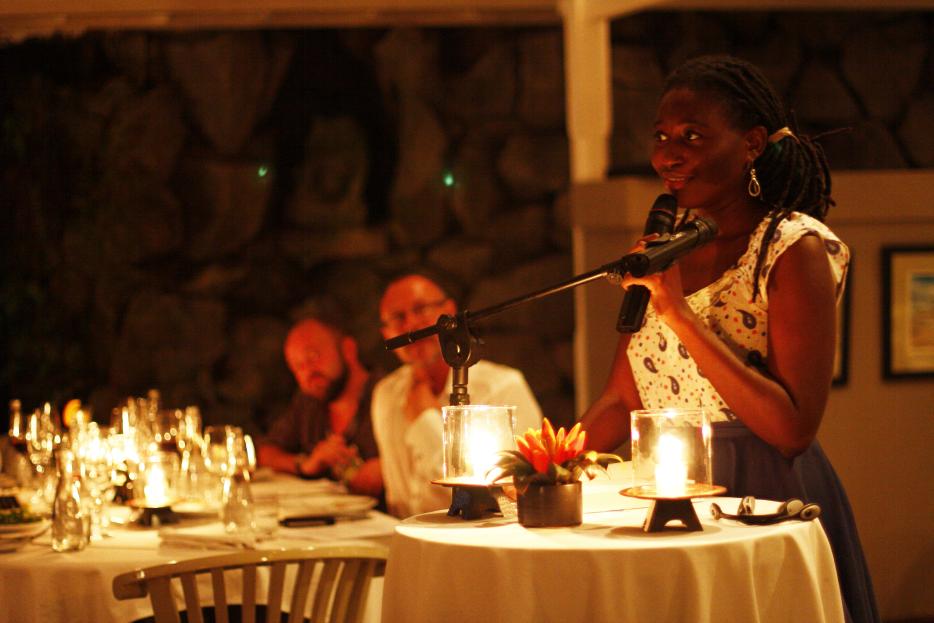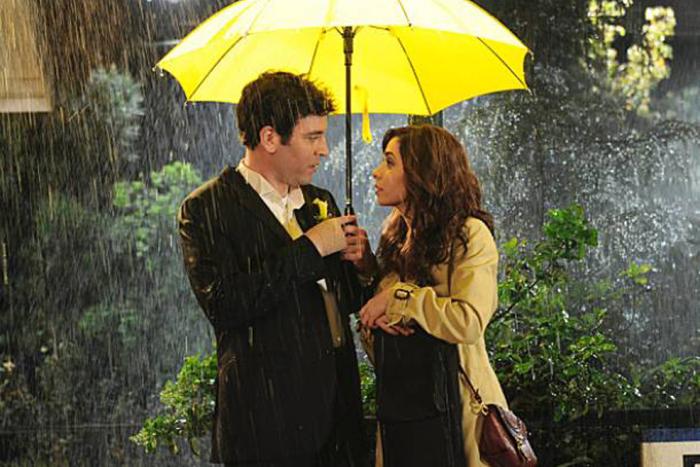With her new novel, Boy, Snow, Bird, Helen Oyeyemi has stretched and twisted the familiar Snow White fairy tale so that we see the world through the eyes of the wicked stepmother, and her daughter by birth. Unlike the Disney interpretation, however, evil isn’t larger than life. It’s in the daily choices made by average people.
We get to know the witch, a girl named Boy, before she normally enters the story—here she is a beautiful, sharp young blonde obsessed with mirrors. She studies her reflection looking for truths, and hides herself away inside the surface image.
Hiding becomes a way of survival for Boy, whose rat catcher father is a violent, menacing figure—a man who could easily decide to end his daughter’s life, just like the vermin he enjoys tormenting. He tells Boy a horrific parable about how to make rats turn cannibalistic, thus doing his own job for him, and foreshadowing the novel’s plot.
Boy, Snow, Bird is Oyeyemi’s fifth novel, and it feels like the Nigerian-born British author is beginning to stretch her wings. Not that she hasn’t reached some dizzying heights already. She hit it big with her first novel, The Icarus Girl, written during her last year of high school, and published when she was only 21 and a student at Cambridge. In 2010, she won a Somerset Maugham Award for her novel White Is for Witching; last year she was included on Granta’s prestigious Best Of Young British Novelists list.
But what is it about second wives and their relationships with stepdaughters that make for such fertile story dynamics? Boy grows up convinced there’s something rotten inside her, which makes her—in many ways—much less rotten to the reader. She remains sympathetic, partly because she admits things like, “The general advice is always be yourself, be yourself, which only makes sense if you haven’t got an attitude problem.”
Oyeyemi’s writing is deceptively simple and serves to underscore the magical plot’s surprising twists. Boy matures from a scared but determined girl into the wife of respected jeweler Arturo Whitman, and then into an obsessive mother protecting her child from a racist society.
Halfway through the book, the narrative voice suddenly shifts, and we see the world through the eyes of Bird—the visibly mixed-race daughter who exposes Arturo’s family as people of colour passing as white.
The story doesn’t let up after that. It hurtles forward on a quest for explanations, understanding and reconciliation. And just when the reader is lulled into complacency, and thinks everything’s tied up perfectly, the last chapters take yet another shocking twist. Boy, Snow, Bird unfurls beautifully, as the three titular characters confront the tyranny of their own images, gender restrictions, and internalized racism.
Oyeyemi and I met on a blustery day in Toronto over coffee and madeleine cookies to talk about amoral women, gender bending, and the joy of messing with fairy tales.
Tell me about the process of writing Boy, Snow, Bird.
I started with the character of Boy, knowing that I wanted this to be a wicked stepmother story. It became clear to me that her wickedness was something that she would have been quite prepared for in her life. I also knew she was going to encounter Snow at some time, so Bird was actually the only wild card.
When embarking on a novel do you come up with an outline or wing it and hope for the best? Your novel curls in on itself and almost goes quiet, then suddenly comes alive.
Thank you. I do not outline. I find it very difficult to write when I know what’s going to happen. I feel a bit trapped. In one of my other novels, White Is for Witching, the story is basically circular, so it begins with a disappearance and ends with a disappearance. It was very difficult and sad for me to write, knowing exactly what was going to happen to the heroine. It felt like I was trapping her, and I wanted my character to go free.
In this novel, there’s a sense of Boy being trapped by her destiny. She’s offered the chance to marry one man though her feelings for another are still up in the air. I raged against her making certain choices, but also understood why she did.
Yeah, Boy is quite puzzled as to why she doesn’t just marry the man that she loves. It’s all weirdly to do with mirrors. I wanted to highlight the way that we live our lives according to appearances. At what point do you just get absolutely sick and tired of surface, and start to look for truer connections between people?
I read an interview with you on the NPR website, and was struck by a quote saying that beauty is a power that’s often used against its holder. Can you tell me a little bit more about the corrosive power of the beauty myth?
I think there’s a way in which we try to read beauty, and make it mean something more than it does. Rather than something that’s just uplifting to look at, we attribute characteristics to it, try to find a hidden purpose behind it. If we feel that we don’t have it or don’t have enough of it ourselves, then we attack. That dynamic is especially difficult between an older woman and a younger woman. There’s a sense of potential for the younger woman—of seeing her future before her and so on. It’s a really difficult dynamic. I wanted to look at the ways that women treat beauty and the way they handle it.
They turn on each other in interesting ways—
Yeah, the novel’s not about so much about the social dimension of beauty as it is about the very level of meaning and whether you can trust a beautiful woman.
Fairy tales are filled with them.
And sinister allusions.
A lot of them were originally written down by men, which makes me think about how we, as women, internalize stories of how we relate to each other and where our allegiances should lie.
Exactly, and the only way to discover these things for yourself is to set aside that narrative and try to find another way… like my characters do.
Why do you think fairy tales and mythology make such fabulous points of departure?
The psychology of them stays pretty much in step with human psychology. As I was writing the novel, I found it so strange that this ancient Bavarian tale could play out in 1950s America. You can literally lift up the characters and place them into any time or place and the story works like clockwork.
I think there’s a way in which we try to read beauty, and make it mean something more than it does. Rather than something that’s just uplifting to look at, we attribute characteristics to it, try to find a hidden purpose behind it.
You’ve lived in so many different cities—Paris, Toronto, London, Berlin, Budapest, Prague. Why did you decide to set Boy, Snow, Bird in New York and the U.S.?
I wanted it to be an American story, because the mirror is so fixated on Snow’s whiteness of skin as the basis of her being the fairest of them all, and America during the 1950s and 60s was a time of great debate over race and the importance of it in terms of the law.
But in this case it’s not so much about Boy, as the wicked stepmother, wanting power, as the fairy tale usually goes. It’s about her wanting to protect Bird, her daughter, which makes her confront things inside herself—
She’s very much about the problems of black people in her time. [At the beginning,] she feels they have nothing to do with her. But suddenly she becomes involved, because of her daughter, which is what forces her to banish Snow.
Why is it so fun to write from the perspective of the evil one?
There’s something fun about an amoral woman in a story. Maybe because we’re socialized to be nice and considerate of each other, and an amoral woman just throws that out the window. The villainess questions the values of the story. When she sets out to kill the fairest of them all, she’s dismantling the worship of all of that and trying to take it away. I tend to identify with villainesses, because everybody else in the story is nodding and saying “how lovely,” and the villainess shows up and just tumbles everything.
I guess you have done a bit of that in your career.
I’m here to mess up all the good fairy tales.
If, as writers, we talk about life as research, how did you put yourself in the mind of Boy?
She was definitely one of the trickier voices that I’ve had, because there’s that huge difference between the way people see her and the way she really is. Beneath the skin, Boy and I were similar. It was easy to write from that perspective, but then there were moments when people would treat her a certain way and I would be like alright, it’s because of this. So there was a kind of slippage there.
What do you hate the most about writing novels?
That they go on so long. You’re in this state of obsession, to some extent, for up to two years. How does your mind stand that?
Ha. Only two years?
Maybe three. You’re going over and over the same ground, trying to work out how to make it real.
There’s such an interesting flow to your work. I kept thinking about a sleeping lion, because you can’t see the muscles, power, or ferocity. Then suddenly it stirs or stretches or moves or runs, and wow. Your writing is deceptively fluid.
I had to work really hard to make it like that. I wanted to write it quietly, because it’s so high-octane in terms of the content and actual story. I wanted the tone to be a weird lullaby. The idea for the rat catcher came from watching this Marina Abramovic video called “How we in the Balkans kill rats.” She’s wearing a white dress against a white background, and talking in the most soothing voice, yet the things she’s saying are horrific. I thought that if I could write a book that is a kind of analogue to that video, then maybe I’d be happy.
How would you want this book to be framed?
I definitely want it to be framed within fairy tale retellings. I don’t think that limits it. Maybe what I want is for fairy tales to be considered more respectable as a literary medium, because when people ask me what I write, and I say fairy tales, they’re like, “Oh, for children?” No. Most decidedly not for children. There’s a sense that fairy tales are lightweight stuff, and we need to see them as the incredibly complex tales that they are in their own right.
What question do you dread being asked in an interview?
Um—“How autobiographical is this?” But I guess people stopped asking me that after the first novel.
Which other writers inspire you?
Well, all the dead ones—Silvia Ocampo, Emily Dickinson... Barbara Comyns wrote a wicked stepmum story for her novel The Juniper Tree, which is a retelling of that fairy tale that made me want to write Boy, Snow, Bird in the first place. It’s such a weird story, but Comyns handled it perfectly. The stepmother in The Juniper Tree is the wickedest of them all. A lot of fairy tales sort of counter balance the terrible stuff that happens by allowing it to be undone if you know the right words, or find the right path. But in The Juniper Tree, there’s no undoing it.
In terms of contemporaries, Jenni Fagan wrote a book called The Panopticon. The heroine is an orphan girl who is tough, alive, sensitive, and wonderful. She scares her own hallucinations, sees faces coming at her out of the walls, and just says “Can I help you?” Which makes them go right back in. That kind of energy and that kind of force is in her writing. Marina Endicott, who’s one of you lot [Canadian]—I love the way she writes about people, and think that having read her and being able to talk about books with her makes me consider moral dimensions much better. Her people are very moral but never, ever in a twee way. They find out that when they hurt other people they hurt themselves unexpectedly. Like going to punch someone else in the nose and somehow finding your own nose bleeding.
There’s also something very female about fairy tales—
Definitely. Historically, they translate into something like “grandmother stories.” Very much about the woman saying, “come, my children, let me tell you this.”
Isn’t that interesting because of the fact they’re so often originally recorded or presented by men.
Hmm.
Or were, a long time ago.
It makes you wonder how they change.





